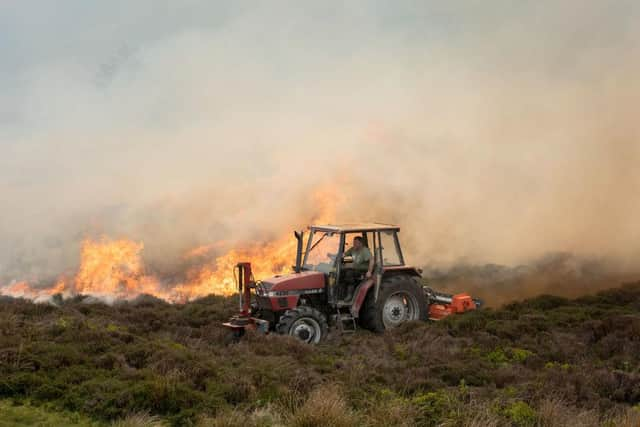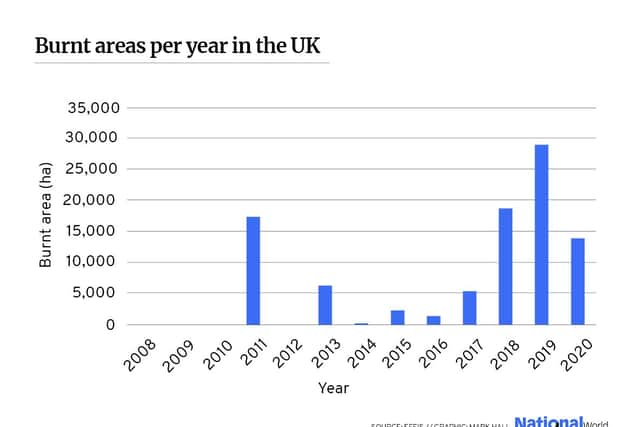UK wildfires risk could increase by 30% due to climate crisis - with area the size of Liverpool burned in 2019


The risk of wildfires in the UK could increase by up to 30% if global temperatures rise by 2C, a report has found.
The increased risk could jeopardise the UK’s path to net zero by 2050, say scientists, as reducing emissions relies partly on using trees to store carbon.
Advertisement
Hide AdAdvertisement
Hide AdIncreased wildfires may also undermine efforts to boost biodiversity by destroying animal habitats.


The findings come from the Climate Change Committee’s (CCC) 2021 Progress Report to Parliament, which both outlines the Government’s progress on cutting emissions and makes recommendations on tackling the climate crisis.
As part of the report, the committee commissioned experts from the University of Exeter’s Global Systems Institute to assess the UK’s current and future risk from wildfires as temperatures rise globally.
Their findings showed that the percentage of summer days presenting a “very high fire risk” in the UK is projected to increase from less than 5% currently to 25-30% if temperatures rise by 2ºC and more than 50% if there is a 4ºC increase.
Advertisement
Hide AdAdvertisement
Hide AdA combination of higher temperatures, more vegetation and more outdoor recreation will likely lead to more summer wildfires towards the end of the century, the experts said.
The Paris Agreement, which the UK has signed up to, pledges to keep global temperatures well below an increase of 2ºC, aiming for less than 1.5ºC.
However, the CCC’s report said that policies to limit climate change are “not yet ambitious enough” to meet the target.
It added that current policies would see an increase of 3ºC by 2100 if ambitions for lowering emissions are not strengthened.
Advertisement
Hide AdAdvertisement
Hide AdAs such, the CCC says that by 2050, temperatures in summer could increase by up to 1.5ºC, though a rise as high as 3⁰C is possible.
If temperatures rise by 2⁰C or more by this point, experts have projected that drier conditions will mean a 25-30% increase in the number of days with a “very high” risk of wildfires.
The frequency of wildfires is already believed to be increasing in the UK, with 2018, 2019 and 2020 all seeing the largest number of fires and largest burned area of the past 10 years.
In 2019, scientists recorded the highest number of wildfires since records began, with almost 30,000 hectares burned - around the size of a city region like Liverpool.
Advertisement
Hide AdAdvertisement
Hide AdFuture increases in wildfire won’t be spread evenly across the UK, said the CCC-commissioned report, with the greatest increases forecast in the south east and central regions of England
By the 2050s, the report predicts that these areas will see the number of days with a “very high risk” of wildfire rise from 20 days annually to 70.
The UK is failing to adapt to this future warming and wildfire risk currently, the CCC has said.
Chris Stark, CEO of the CCC said “nature based solutions” like tree-planting will be essential to tackling the climate crisis. He warned, however, that tree planting will be at risk if the UK government fails to adapt to the changing climate and its associated risks.
“We are going to fail on net zero if tree planting is in places where those trees will die because of drought or wildfires,” he said.
Comment Guidelines
National World encourages reader discussion on our stories. User feedback, insights and back-and-forth exchanges add a rich layer of context to reporting. Please review our Community Guidelines before commenting.
